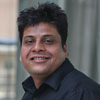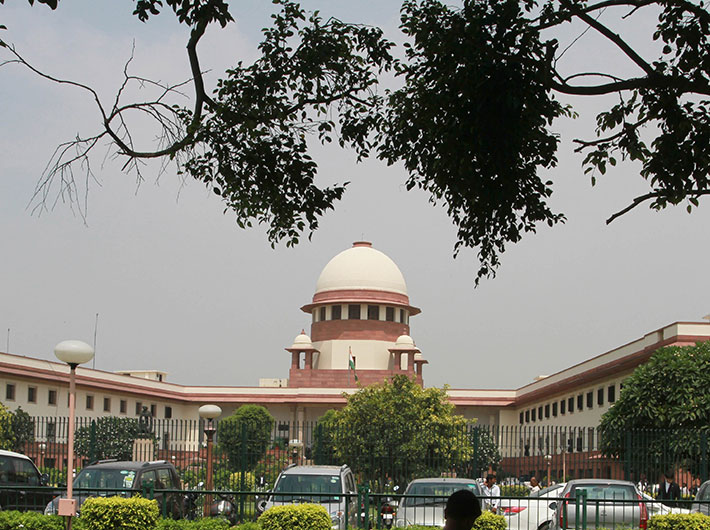Bench-hunting, or lawyers looking for a ‘favourable’ bench to hear their case, is not exactly a red-hot 2014 charge. But why is it still a hush-hush topic?
Around 11 am on March 24, an hour into the supreme court (SC) resuming work after a week-long Holi break, senior lawyer Dushyant Dave entered court number one – the chief justice of India’s (CJI) court – and made an accusation that stunned everyone present. He alleged that a two-member bench of SC is the “chosen court of builders”.
“Serious fraud is being played upon this court… Forum shopping is happening in this court,” Dave said, dropping a bombshell before the CJI, P Sathasivam, as brother judge Ranjan Gogoi and others present in the court looked on – shocked.
Dave was referring to the bench of court number 10, presided over by justices Gyan Sudha Misra and V Gopala Gowda. The senior lawyer alleged that a property matter – HK Sudhakara vs M/s Metropolis and Hotels and Others – was ‘inappropriately’ tagged with an unrelated matter being heard by that court. “I am severely depressed,” he further said. Taking note of Dave’s complaint, the CJI summoned documents and later clarified that the matter was listed in court number 10 due to a “mistake” by the court registry.
The mistake was “rectified” and transferred to another court subsequently.
Later, when Governance Now asked Dave whether he would like to share more details on the issue, he politely refused. “It doesn’t look good that I speak to the press about it. I have already raised it at the appropriate forum,” he said.
Not a new accusation
Usually, the colonnaded corridors of the supreme court are the best place to meet the the country’s most vocal, articulate, courageous and powerful lawyers under one roof. Hopping between courtrooms for hearings, they often stop by for a quick chat with journalists to share opinions and updates on their own cases, as well as others they know of. However, when Governance Now approached them to discuss what is known as bench hunting, or forum shopping – an issue that directly relates to them – not many were interested.
Forum shopping is a practice in which litigants, represented and aided by their lawyers, get a particular bench to hear their cases and pronounce favourable orders for them. The practice, understandably, can only be possible if there is complicity between the litigants,
lawyers and court officials.
While litigants and lawyers can be spoken against, not many speak against the court or judges because of the Contempt of Courts Act, 1971. The Act can be invoked for showing disrespect to the dignity of a court. The result: what should have been a transparent debate has been largely reduced to sullen whispers.
Dave’s head-on opposition to the alleged practice of forum shopping in India’s apex court substantiates a few dissenting voices raised against it.
Two weeks before he made the complaint in CJI’s court, Dave wrote a letter to justice Sathasivam complaining about another two-judge SC bench. In this letter, he questioned how, in February, a bench of justices CK Prasad and Pinaki Ghosh suo motu tagged a case of allotment of 35 acres of prime land in Mumbai (listed with another three judge-bench) with an unrelated criminal matter it was hearing.
The matter concerned allotment of this land for an 18-hole golf course and country club by the City and Industrial Development Corporation of Maharashtra (CIDCO).
The two-judge bench ended, within two minutes, a 12-year-old battle and awarded the allotment to the original winning bidder – Mistry Constructions – at a throwaway price of Rs 33 crore.
In 2010, the Bombay high court had set aside the allotment and asked CIDCO to initiate fresh national bids with a reserve price of at least Rs 100 crore. The SC had been hearing an appeal against the Bombay HC order. The present estimated market price of the land is more than Rs 1,000 crore.
A closer scrutiny of the case reveals that barring CIDCO being a common party in both, there was no relation between the criminal case and the golf course land allotment case, a point Dave also raised in his letter.
There are, thus, three disturbing questions over the manner in which the two cases were tagged and the golf course land allotted to Mistry Constructions.
First, how did the bench comprising justices Prasad and Ghosh come to know the nitty-gritty of the CIDCO golf course case when it was being heard by a three-judge bench?
Second, can a bench suo motu drag a case in its court from another court without a request by any of the counsel involved?
And, third, what action is being taken on Dave’s letter? Also, will the order be recalled?
According to legal experts, it’s not only about the two cases that Dave has raised but a general pattern of forum shopping that has beset Indian courtrooms for a while.
Senior SC lawyer Prashant Bhushan has earlier faced contempt of court cases against him for being vocal about judicial corruption. In one affidavit replying to a contempt notice in 2010, Bhushan had pointed out that the then CJI, KN Singh, during his 18-day tenure between November and December 1991, had ordered several cases involving Jain Exports and Jain Shudh Vanaspati to be listed before him. A bunch of those cases were decided in favour of the two sister concerns. Later, all the orders were reviewed and reversed after objections were raised by opposition counsel.
Speaking to Governance Now, Bhushan called the CIDCO issue a case of “judicial impropriety” – one that reeks of “dishonest motives”. “Forum shopping happens in three ways,” Bhushan said. “By seeking to list a case before a particular judge, by avoiding a particular judge, and by writing bogus complaints to the CJI to remove an honest judge from a particular case.”
The judiciary is replete with examples of litigants seeking to either get their cases listed with or transferred to allegedly favourable benches.
In March, after being sent to judicial custody by an SC bench of justices KS Radhakrishnan and Jagdish Singh Khehar, Sahara chief Subrata Roy’s counsel asked the two judges to recuse themselves from the case as they were “biased and prejudiced”.
In the Aarushi Talwar murder case, one of the most prominent cases of recent times, the CBI in April 2012 accused Nupur Talwar of bench-hunting when she filed a plea in SC for reconsideration of the apex court order asking her to face trial.
The courts themselves admit the practice of bench hunting in some of their orders and observations. In March 2012, senior Maharashtra Congress leader Kripashankar Singh made a plea in a corruption case involving him before a different bench when he had already withdrawn it from the court’s mentioning list a day earlier. “We are very sorry, this cannot happen. This is nothing but bench hunting,” the two-judge SC bench had observed while refusing his plea, the media had reported.
In his short tenure as the 39th CJI during 2012-13, justice (retired) Altamas Kabir courted serious allegations.
In July 2013, a good two hours before then CJI Altamas Kabir-led three-judge bench of the apex court quashed the single-window national eligibility-cum-entrance test (NEET), advocate Gopal Shankarnarayan, in an article uploaded on a legal news website, predicted the verdict, the grounds and the dissent. It turned out true.
Shankarnarayan wrote in the article that the petition by private medical colleges will be allowed on the ground that the medical council of India did not have the jurisdiction to notify NEET. He also predicted that justice AR Dave, one of the three judges, will dissent from the order, which turned out to be true.
The lawyer based his predictions on “stories shared by senior counsels and junior advocates alike” before the judgment was to be announced. “It is my fervent hope that this tale is false – a figment of some perverse and destructive mind. In a few hours, we will know the truth,” he wrote.
Eyebrows were raised when the Sahara-SEBI case was heard out of turn by the bench headed by CJI Kabir while it was pending before another two-judge bench. Questions were also raised when the petition by Bharti Airtel chief Sunil Mittal and Essar promoter Shashi Ruia for quashing of summons in 2G spectrum allocation scam were heard by a Kabir-led bench even as the main case was pending before another two-judge bench.
Asked for her views on the practice of bench hunting in Indian courts, especially the supreme court, additional solicitor general Indira Jaisingh said: “Anything which is anti-institutional shall be curbed. The issues raised in Dushyant Dave’s letter over bench hunting shall be looked into.”
A well-known SC lawyer, requesting anonymity, said, “Bench hunting is one of the many malpractices happening in our courts and it is good that the issue is being raked up by a section of lawyers and the press.”
One of India’s best-known constitutional experts, who also didn’t want to be quoted, said that for several of India’s top-notch high-paid lawyers “to be able to hunt the bench of her/his choice is often more than half the battle won”. He went on to say that a lawyer’s fee is determined not just by his debating abilities and legal knowledge but also by the ability to get a case listed before a favourable bench.
Legal expert and former Delhi University vice-chancellor Upendra Baxi said that forum shopping should be mentioned clearly in the Judicial Standards and Accountability Bill, 2010, which provides for a mechanism for investigation against judges. “Judges are allowed to use discretion. But that should fall within the principles of constitution,” he said.
“The problem is with the vacuum the other institutions – legislature and executive – are creating by abandoning their responsibilities,” Baxi said. “This gives courts new-found space to act in discretionary manner. But judges should not behave as if they are the absolute power.”
In normal circumstances, such a head-on opposition to bench hunting as raised by Dushyant Dave in the CIDCO case could have invited a contempt of court notice. However, that has not happened. Is the judiciary aware of its own vulnerability in doing so?
In the process, even as the recent events reflect a very disturbing trend, faith in the highest institutions of justice is gradually but surely getting eroded.
(This story appeared in May 1-15, 2014, issue of the print magazine.)

